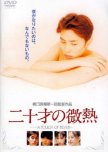
Slower-paced Than Most, But Worth A Watch
Aside from the drawn-out scenes (the family dinner, for example), this film has a bit of depth to it. Watching the two main boys navigate (with dubious success at times) their way through the conflicting emotions of their job, their "Johns", their family, and each other, really makes you experience their lives very nearly from a first-person POV. At times segments are uncomfortable to watch, but worth it.Was this review helpful to you?
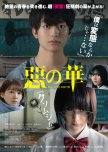
A misunderstood gem that's beautifully disturbing and depressing.
Where to watch :https://www.youtube.com/watch?v=N4y74UaBIDA (English Subtitles)
Or here : https://mega.nz/file/hjUBWCTZ#TjkrmK0Gmwz8MhGmyGAaDm6TxxtK3lwTjRPpIz5bBKA -> You'll have to download the subtitles you're searching for on SubDL, then use VLC to open the video and add the subtitles. Or you can just download it from Avistaz (like me), the subtitles are also there but you need a client (I recommend Deluge) and an account.
---
“I dedicated this movie to all the boys and girls who are now suffering, or have suffered, from puberty.” - This message shows before the film starts.
---
Disclaimer: I didn't read the manga, but I know they had to condense 57 chapters into a 2-hour movie, which is a lot (obviously it can't be as detailed and the story will be shortened), and I’m aware there are differences. There’s also an anime, but it’s incomplete since it never got a Season 2. And before anyone complains, this as japanese as it could be, so expect it to be weird, bold and crazy (then that's what makes it so good, too). But it is epic and fascinating, nonetheless.
---
This was an intense psychological mindfuck on my part. I've never had so much to say and I can't believe how much I felt in such a short time. It is not only deeply philosophical and heavy on psychological study (this is like the most I have seen even though it's only 2 hours) but also on a critique of Japanese society.
I loved it so much. I think they did really well with the pacing because I didn't ever get bored and I managed to get the psychology overall (which is nothing short of insane) and in the end, it is what all the story is about. Not to mention the cinematography, the poetic dialogue/storytelling, and the intense build-up. It’s a pleasure for me to see a reference to French literature with The Flowers of Evil being used as a metaphor (not only referenced, it is inspired to the point where you'll recognize Baudelaire's atmosphere), and the Japanese need to keep making stuff like this because that’s where they really excel.
As I mentioned, the cinematography is excellent. With a solid budget, the film is thoughtfully shot—artistic, visually appealing, and carefully crafted in every scene. It has such great cinematic value that I had goosebumbs in some scenes.
By the way, there’s the drama Shounen no Abyss I need to watch, which also picks up on the idea of a teenager trapped in a rural town (the difference being that he doesn't have an "ordinary" life like Kasuga in Aku no Hana). A friend who’s a fan of J-dramas recommended it to me, and it seems really dark, artsy and completely unconventional as well.
Now the cast, it was perfection. Nakamura looked exactly as intended in the synopsis (creepy, weird, friendless), the actress nailed it and I was really attached to her but I'm gonna say it: Kentaro (Kasuga's actor) is the real gem here. Such a cute, influenceable, vulnerable, innocent face for such a distorted role (my guilty pleasure), and pure young talent (though honestly, the actress (Tina) is also too good and deserving of praise). It seems very likely to me that Aku no Hana was THE improvement in their acting and probably will stay their best work. It's clear they were very serious about it, no wonder I even read somewhere that they were fans of the manga. I'm just so, so glad they took it on. Huge respect for the production team too, and the author of the manga with whom they worked closely (funnily enough, the film cleared some confusion about characters motivations for some readers). It's magnificent to see such a story brought to (real) life. Of course, well-done supporting cast as well, no one made me cringe or anything, they were all believable and serious in their roles.
The music I thought added what it should to the scenes. There was one scene where it amplified my urge to cry. I also added the songs to my playlist.
Did I mention the way the film starts? Oh. My. God. Insanely good. And well-done all throughout. Really, they achieved the impossible with this one. How did they even manage to capture it all, so well?
It's important to note that the Japanese have their own unique and often subtle way of doing things, which is sometimes misunderstood by foreigners. Regardless, I'll do my best to explain.
I do not spoil any major event but it might be better to read the rest of my review later (if you want). Thank you for reading !
---
Kasuga isn't exactly like the others, that's clearly shown from the start. He feels like he's different and doesn't fit in, or rather he would like not to, the latter being intensified when he gets closer to Nakamura. He had no special bond with anyone before Nakamura. In addition, what's key here is that they both are premature. Obviously, they are very much introverted as well.
The story would be nothing without Nakamura, she's really intriguing and absolutely not ordinary, contrasting with Kasuga. While Kasuga’s journey feels like an existential crisis—a struggle with his own identity and a sense of purpose as he suffers from being ordinary—Nakamura’s is more of a rejection of society itself, rooted in a raw contempt for conformity and superficiality. However, we can guess that this is also caused because of a profound lack of self-worth and self-love. Also lack of mental help and there is a lot of reason behind this, however this is for those who have the necessary knowledge on Japanese society, so I shared an explanation that's not mine at the end of my spoiler in the comments section. It is shown that she lacks a conventional family structure, hinting at a turbulent background that likely shaped her mentally unstable character (unless she has always been, or it worsened, especially with puberty). People shouldn't disregard the impact that a lack of love/attention can have on a child while growing up, caused by the physical and/or emotional absence of their parents (often because of work, particularly in Japan). Rather than just a weird, evil character, Nakamura should be seen as a victim—a consequence and by-product of many factors. Besides, her mother didn't quite look "normal." In such critical situation, a parent should be terrified.
Kasuga feels so strangely real and relatable (Nakamura does too but it's not the same, for me at least), I love him so much. It's so strangely human with the imperfection and complexity of it all, and this is why I think this film is beautiful albeit twisted. I love it when things go into ‘screw it, who cares’ mode, and the surreal aspect of the film just adds to it. Such a unique feel. It’s like witnessing the awakening of two souls who, for the first time, truly feel alive and seen by one another as they spiral into darkness (by embracing it). Taking an autodestructive and anti-social behavior, they reject humanity and unravel the fabric of reality itself, bound by a shared disdain and a need to question everything. What matters here is that deep inside, they are both lonely and insecure, misunderstood and alienated from the real world. The story leads to Kasuga being almost as broken as Nakamura when he realizes how empty he now feels. Because of that, he becomes the most dependent of the two. He had nowhere else to go anymore. He had to be with her. Looking at it from their perspective, it feels like watching the end of the world, doesn't it? The Flower of Evil itself appearing on the screen really strengthens that feeling.
Puberty is in full swing, which is crucial to Aku no Hana's story and tone. The characters are experiencing intense hormonal and emotional changes, amplifying their insecurities, rebellious impulses, and attraction to the forbidden. This period of overwhelming puberty adds a raw, almost chaotic layer to their actions and interactions, especially in how they express—or suppress—their darker thoughts and desires.
(Also, they are in their final year, which possibly adds a stress factor. It's something very common especially in Japan, and the point of the story and their character development is to free themselves (not in the right way but it is what it is), which means that something like this quickly becomes irrelevant, and was just an addition to everything.)
Kasuga, for instance, finds himself obsessed with Baudelaire's The Flowers of Evil *, and his fascination with the book’s themes of sin, guilt, and beauty is heightened by his adolescent intensity. Nakamura, on the other hand, is grappling with her own disillusionment and rebellion, pushing Kasuga to confront the darker parts of himself, which he barely understands. This combination of puberty’s volatility and the characters’ existential confusion is a huge part of why the story feels so unsettling yet relatable for some viewers/readers.
---
* The Flowers of Evil by Charles Baudelaire isn’t typically classified as "abstract" in the strictest literary sense, though it explores themes that can feel abstract—like beauty, death, melancholy, and sensuality. Rather, it’s one of the foundational works of literary modernism, known for its use of vivid, often decadent imagery and exploration of taboo subjects. Baudelaire’s poetic style is concrete and sensual, often rooted in specific imagery and settings, which he uses to convey his complex themes and moods.
The collection’s innovation lies more in its symbolic and existential exploration than in abstraction. Baudelaire often used real-life imagery—such as the city of Paris, nature, and mythological references—to depict the inner turmoil, ennui, and the conflict between the ideal and the sordid aspects of human experience. These layers of meaning make the poems symbolist in nature, but not abstract in language or structure.
However, his use of synesthesia (combining senses, like taste and color), surreal contrasts, and symbols does push the boundaries of traditional poetry, pointing toward later, more abstract literary movements like surrealism. So while The Flowers of Evil itself isn’t abstract, it paved the way for later writers to experiment with abstraction and the inner landscapes of consciousness.
---
Aku no Hana is definitely philosophical and nihilistic. To sum up the themes quickly: 1. Existentialism and Identity 2. The Nature of Freedom and Rebellion 3. Guilt, Shame, and Moral Ambiguity 4. The "Abyss" * and the Dark Side of the Psyche 5. Alienation and Modern, Youthful Angst
It uses its psychological and unsettling storyline to probe questions about freedom, moral conflict, and identity. It doesn’t offer straightforward answers to these philosophical questions, but rather invites viewers/readers to confront the darker, often unspoken aspects of human existence.
* The "abyss" recalls philosophical ideas from Nietzsche's concept of the abyss ("if you gaze long into an abyss, the abyss also gazes into you" ~ remember when The Flower of Evil visually appears) and Carl Jung's notion of the "shadow," the darker, unconscious part of the psyche.
Nakamura is drawn to Kasuga because she sees him as someone who, like her, feels disconnected from society's conventions. Her interest in him is rooted in a desire to unleash his inner perversion and bring chaos to his life, reflecting her fascination with rebellion and psychological manipulation. This bond between them is emotionally charged and obsessive but also genuine.
I've truly never connected to a fiction this much. This film was an incredible emotional release in my case, but it's really not a common one. It provoked something within me that I never externalised, and for this reason it is an unforgettable film that will likely remain my favorite for a long time, if not forever. I already watched it twice in a row as I am typing this. On a side note, I will never complain about things being exaggerated/over-the-top (as long as it's well done) because that's the beauty of art, and also why this film was so impactful. Especially for me. Besides, aren't the characters supposed to be kind of crazy? See, it fits anyway.
Be sure to stay until the very end of the credits. The final image is a powerful, symbolic moment that beautifully echoes the story's essence at its core, offering a haunting parallel that will resonate deeply with what you've just witnessed.
I have a lot more to share, but since it really goes into spoiler territory, I'll put that down in the comments.
P.S: "At first, I read Baudelaire’s Flowers of Evil and felt drawn to its raw intensity. I searched for a movie adaptation and stumbled upon The Flowers of Evil. Initially, I related to Kasuga—the isolation, the feeling of being misunderstood, of screaming into a void that doesn’t respond. But as the story unraveled, I found myself slipping into Nakamura’s world, her genius wrapped in madness. She’s like the abyss itself—a place where potential is devoured, yet there's something seductive and tempting in her chaos, something freeing. Slowly, I started looking up to her, not just her defiance, but her utter disconnect from the world’s rules. It felt like she was showing me the truth I was too scared to see: maybe I was wasting away, too." YES, this encapsulates my feelings.
Was this review helpful to you?
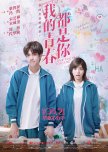
kinda weird
This movie was honestly really bad? Main couple had no chemistry, MMC was just... weird. There was no tension, no build up, (except for some minor foreshadowing) and everything just got thrown at us at the end. Didn't like the plot. I wanted warm fluffy youth and I got weird unrealistic unromantic whatever this was. Acting was OK. Overall not worth the time.Was this review helpful to you?
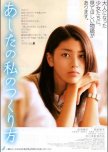
This review may contain spoilers
“How to Become Myself” could also have been called "how to stop people pleasing".
Have you ever felt like you always have to act in front of people, so they don’t see your true self? Your scared, vulnerable, sensitive self? Have you ever wondered who you really are when you’re not someone else?Who are we when we don’t try to fit in with others?
I think these were the questions the film wanted to raise with a very authentic and inspiring innocence and simplicity.
And I think the final answer could be this:
even when you try to be more or less than you really are, it’s still you.
Your being is beyond what you do or don’t do, your lies or the roles you play. This need, this choice to become someone else to avoid suffering and/or to satisfy and please others is a component of who you are.
There is no need to deny it, you always have the right to be loved and accepted, truly, by others but especially by yourself.
You are not stuck, you can change, you can be someone completely different if that is what you desire and need, your identity is more than what you think. Your identity isn't stagant or rigid, it is free and abondant.
You are the author of your own story, not others. You get to decide how you want to live your life.
This movie could have been done better, that is undeniable. There are many scenes that were a bit too long, more dialogues were also needed, the pace got bad in the middle of the movie even though it is obviously a slow paced movie...
However, the beauty of the heart of the movie remains intact and very powerful, because it is about self-identity.
The intimate theme of self-identity is so complex that, obviously, only a truly innocent approach could answer it naturally. And that's exactly what the movie did.
I think people, situations, and things are complex only because there is a refusal to face and accept the simplicity of the reasons that motivate the complexity...
The boy says to the girl, "I don't understand this 'real me' and this 'fake me'. I love that Hanada Kanako is in front of me. Can't I? Can't I love you?"
And the girl realizes that she has misunderstood what love really means; it was only when the boy enlightened her with a simple truth that she began to understand.
When you see what true love is, how simple it is, you understand that you don't have to do anything for people to like you or not. You just have to be yourself no matter what. True love conquers all, true love means unconditional acceptance.
A scene made me cry and touched me deeply and I want to share these inspiring lines to motivate more people to try this movie :
"I didn't want to accept myself living here right now as the real me.
Because she's so dull and uncool.
"It's the fake me, so it can't be helped." It made me feel better thinking that way.
But I found out.
The cowardly me, the role of myself that I play, they're all me.
Me, who wants to run away, me, who lies ... and also me, who gets hurt ...are all me."
Was this review helpful to you?
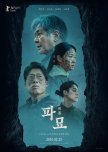
Slow Burn At Its Best
If you're out for a horror movie with plenty of jump scares, look elsewhere.Unlike your typical horror movie, supernatural beings don't get "accidentally" summoned by a bunch of irresponsible drunken teenagers, there's no cringey "I'll be back" dialogues, no jump scares, no slamming furniture, flying objects and creaky floorboards, no adrenaline inducing score to keep you at the edge of your seat; just a clever blend of cultural folklore, metaphysics, pacing and build up.
Divided into six different acts, "Exhuma" tells the story of a shaman and a geomancer, who are recruited to help a rich family conduct an exhumation of their ancestral grave.
Act 1, introduces the audience to the leads, who they are, what they do, and slowly reel the audience in by placing an unpredictable twist at the end of each act, making the audience wonder and hunger for more. Just when you think that you're right, you couldn't be more wrong.
There are, however, some obvious loopholes in the film, which might have been cut for time ("Exhuma" has a runtime of 134mins) but those loopholes seem like forgettable side quests, that doesn't really affect the main storyline.
Everything is meticulously calculated, everyone knows very well what they are doing, everyone knows what they are getting into.... except the audience.
Was this review helpful to you?
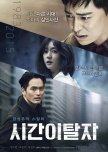
This review may contain spoilers
Exhilarating and thrilling crime thriller
Watching a time travel film after completing a time travel drama with the same lead actor is something lol. However, I was not bored as it is definitely a very different type of story despite being the same genre. I love the thriller, mystery and fantasy elements of it all. The set design for the past timeline was done very well. It was an exhilarating and thrilling crime mystery. The performance from the actors was amazing. The romance from both timelines is very convincing and equally appealing.Was this review helpful to you?
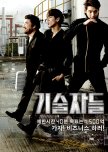
This review may contain spoilers
Predictable but enjoyable watch
A somewhat predictable plot but it is executed well enough that it was a decent watch. The crime process was definitely intriguing and thrilling to watch. It was fun seeing the unique ways the characters planned their crimes. The chemistry between the three men is very good and they have a good banter amongst them. Despite the predictability of the film, it is an easy and enjoyable watch. Just don't expect to be wowed with a groundbreaking psychological crime thriller.Was this review helpful to you?
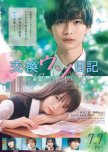
Will definitely cure your classic Asian high school romance drought
Love love love! It has the classic Japanese/Asian high school romance vibe without being cliche and overly predictable. For a romance film released in 2023, it is a surprisingly refreshing high school romance. I enjoyed every single moment throughout the film. It is such an adorable film! I can't express enough how much it really exudes the classic Asian high school romance film in the best way possible. In a time where this genre is very hard to nail without being predictable and boring due to the many classic predecessors, this film is fresh and exciting while maintaining the classic Asian high school romance feel. I didn’t think I could feel anymore with high school romance films so thank you ‘Our Secret Diary’ <3Was this review helpful to you?
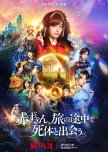
This review may contain spoilers
Amazing production and visuals but lacklustre and somewhat disappointing story
First of all, the production value and visuals of this film are amazing!! It is definitely on par with that of a Hollywood movie of its calibre like ‘Mirror Mirror’. The costumes and props were also equally well done and executed. Fabulous. Absolutely fabulous.In terms of the story itself, I’m pretty conflicted but I think I have to say it felt meh overall to me. I’m not sure if it’s because it impedes on the typical fairy tale tropes so dear and well-known to my heart or if it’s truly because the execution was poor. The concept in itself is pretty fresh and interesting. I think it just didn’t seem to execute it as well as it could have while keeping the well-known tropes we all know and love. I did find myself getting, not necessarily bored, but disengaged at some parts throughout the film. I did like the whole Sherlock Holmes type of aspect to it and the whole crime solving was definitely very interesting. I think where it lost me was having Cinderella revealed as the murderer. While yes, choosing her did make it to be a big unexpected shock for a plot twist because of what we know of this iconic fairy tale character already, this same reasoning acts to weaken the story’s appeal. When dealing with such iconic and well-known characters, there has to be a level of consideration for the viewer’s preconceived perceptions and opinions for that character. Especially with a character like Cinderella, this is unavoidable. For this reason, having Cinderella be the murderer left a bad taste in my mouth for this movie overall. I, as the viewer, know Cinderella in many forms of media to be a heroine and a likeable character and I know her backstory very well (which this film didn’t delve too much into presumably because they know we know her character). I, as the viewer, know that her character has a history of severe mistreatment from those around her and being wronged, so having her character end up like that seems like a huge injustice to me because of my preconceptions. Further injustice is felt by the own world that they have constructed to place her in, where the kingdom disregards people like her because she is ‘ugly’ and poor. Additionally, the dude she murdered was a literal creep and bad person, so technically she acted in self-defence. This was literally not even acknowledged like free my girl right now purrr ???
Overall, the film's visuals were very high quality and well produced, but it fell short with its story. The story's execution is quite disappointing because the concept in itself is very interesting. In trying to be bold and shocking in its crime mystery, it neglects the viewers’ preconceived opinions of classic fairy tale characters. The film did have its moments where it was fun and campy, so I will give it that.
Was this review helpful to you?
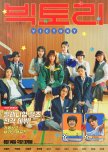
Typical Sports Movie but Fun
It's fairly predictable to the end but if you like sports movies and movies about female friendship, you can't go wrong with this one. I liked that there was no love triangle or too much jealousy or backstabbing or any of those things. The issues that arise are fairly mild . And this might be my bias showing but Hyeri once again proves to be utterly charming.I will say that the period trappings didn't enchant me as much as say Twinkling Watermelon or Reply 1988 but it grew on me as the movie went on. Overall, it's fairly well done with strong acting and a tight script. I would recommend.
Was this review helpful to you?

Somewhat predictable but the actors really elevate the film for a heartwarming story
The story is a bit predictable, but heartwarming and fun nonetheless. The actors all did a fantastic job in their roles, which really makes the film. The performance from all the actors really elevates the film, which was honestly essential for a film that focuses on family relationships. If you want to watch something that will potentially make you cry but also warm inside, then I would definitely give this film a go!Was this review helpful to you?

needed to be expanded into a miniseries, or else rewritten into a tighter narrative.
This film is extremely pretty to look at - and I'm not just referring to the rugby thighs of actor Chu Meng-hsuan! But amazing visuals are just about all the film did for me. So I cannot recommend it, unfortunately. Below, I will discuss the major formal aspects in the same order that I started noticing them while watching the film:Filming: amazing!! and very, very red.
The cinematography is stylish and gorgeous here. Lighting and colors are dramatic in a way that reminds me of Mag Hsu's 2018 Taiwanese film "Dear Ex" (btw, if you were thinking of watching "The Time of Huannan" but haven't seen "Dear Ex" yet, go watch "Dear Ex" right this second! it's such a good film.). Shot composition is occasionally stunning, especially when neon lights are involved.
Soundtrack: ugh.
The musical soundtrack is way too busy, in a way that reminds me of some Asian drama series. I recognize that busy soundtracks are really a matter of personal taste, and to be fair the film does embrace silence in some sections - I just wish it leaned into that more! Anyways, with everything going on in it, the soundtrack also never actually manages to build a substantial contribution to the mood of the film. This is at least partly because of the specific song choices (which I felt were really mismatched to the film, but perhaps that's also a matter of personal taste): the musical styles of the songs are so different that they don't stand together, because nothing else in the film ties them together. It felt like the director couldn't figure out how to tell a story using music, and he also couldn't figure out how to select music to match the visual+emotional journey of the film. As a result of these problems, the soundtrack was a very annoying and intrusive experience for me.
Narrative: uh-oh...
The film has a number of narrative problems because the director/writers tried to squeeze too many stories and threads into the film. For example, one of the queer characters discloses being sexually assaulted, and then that emotional bomb is totally ignored for the rest of the film; such trivial treatment of that topic makes it feel like the film is (hopefully unintentionally) doing a spectacle of queer pain from the perspective of the heterosexual protagonist - a spectacle which is even more one-note than the harshness of Liu Kuang-hui's 2020 Taiwanese film "Your Name Engraved Herein". Because the narrative tries to do too many things with its four main leads, the characterization ends up rather shallow and flimsy. Even though the film is already on the longer end for conventional cinema, with a runtime of 2.25 hours, there just wasn't enough time to develop the characters enough to make me connect with them before the story tried to get an emotional payoff. For most of the film I felt very little sense of interiority in the characters, and not enough understanding of who the characters were to help me empathize with their motivations for their behaviors. The film ends by indulging in melodramatic sentimentality (complete with flashback montages in the style of mass-market Asian dramas) which felt cloying to me because the necessary emotional weight was not properly established beforehand in the characterization, and because of all the plot contrivances made to justify the ending.
Editing: meh.
The problem with this film is that its pacing is driven by a flawed narrative. Unfortunately, the pacing holds back the high-level composition of the film: different scenes are edited together in a way that never really works for me. The result didn't give me a sense of cinematic rhythm comparable to the rhythm of different shots within each scene, and I didn't really feel a sense of temporal coherence. Because of this, the film felt more like a dream of free-association jumps between different moments than the continuous narrative demanded by the plot; this wouldn't have been a bad thing if the film had been constructed specifically for such a structure (e.g. if the time travel had been via dreaming rather than a handwaved science-fictional mechanism). Alternatively, this wouldn't have been a thing at all if the film had instead been constructed as an episodic miniseries.
Missed opportunity 1: a miniseries.
Imagine if the story had been given more room to breathe as a drama series. Then we could've spent time with each character to learn about their background, their hopes and dreams, their worries and struggles. And flashbacks would have actually felt temporally significant. These are all strengths of the 2023 k-drama "Twinkling Watermelon" - and its story also happens to be a "young adult travels back in time and learns about his father as a young adult and encounters barriers to changing history" plot with an ensemble of four main characters. So maybe you should watch that series instead of this film.
Missed opportunity 2: a tighter film.
Or imagine if the story had been simplified in the direction of minimalism. Then we could've spent much more time with the striking cinematography, lingering on gorgeous and thoughtfully-designed shots as the actors traveled through time and space. If we slowed down pacing all the way into the extreme of slow cinema, then the director could even have deleted all the songs from the soundtrack and come out with a better film. A big part of the artistic quality of the slow-cinema films of Taiwanese director Tsai Ming-liang - which only have the absolute minimum bare bones of a plot - is that they give their shots plenty of room to breathe in order to reshape our experience of time; the striking visuals drive the pacing of those films, in the process showing us deeper truths about the characters. Tsai makes films with powerful imagery instead of strong storytelling, because of what he's good at (e.g. he said, "The storyline might be plain, but it is meant to carry the power of imagery, so as to reveal the essence of cinema. [...] I never thought of myself to be a good storyteller. Therefore, I chose to be otherwise.", in a talk which has been translated at the Senses of Cinema blog); "The Time of Huannan"'s director could probably have made this film good with powerful imagery, instead of trying and failing to tell a good story. But even stopping far short of slow cinema by keeping a more textured story could've yielded a truly great film - perhaps something like "Dear Ex", which has a more relatable, complex, and emotionally moving narrative than "The Time of Huannan" (and also one about a guy learning more about his father! go watch "Dear Ex" instead of this film!) while also being significantly shorter.
Conclusion: a hollow apple.
Because the film lacks a solid core to drive its visual polish, it's like what Scott McCloud describes in his book "Understanding Comics" as a hollow apple: art which has a shiny surface but is empty inside.
Was this review helpful to you?
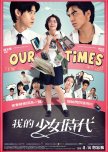
cuties
this was adorable but i hate the fact they changed the adult actors 😭 cuz why did my gorgeous biker delinquent turn into mullet dude... also i thought there was gonna be time travel and a fantasy element to this but there wasn't so a tiny bit disappointed about that I guess but at the same time it was done pretty well and mmc was super sweet so great movieWas this review helpful to you?
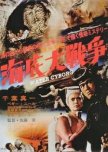
Reporters Ken and Jenny are aboard a navy sub in order to watch a new torpedo demonstration when a mysterious creature swims by the viewing window. Later the two don their scuba gear and go back to investigate. Jenny is confronted by one of the creatures and escapes. Commander Tom Brown says he doesn’t believe her, and like a good man from the 1960’s, recommends she see a psychiatrist. Ken does believe her and the two once again go underwater to see what’s going on but are captured by the strange creatures. They awaken to find themselves dressed in white pajamas and scuffed up white go-go boots. Dr. Rufus Moore introduces himself and explains his plan, showing the transformation of a man into a Creature from the Black Lagoon. Ken and Jenny seek to avoid that fate while their friend, Commander Brown fights bureaucratic red tape in order to rescue them.
I have a high tolerance for cheesy old monster films, but this one tested that tolerance. With the exception of Sonny, who looked great here I might add, the acting was abysmal. Not even in the cheesy, “Welcome to my lair, Mr. Bond,” kind of way. The costumes had issues with gaping spots and one was literally coming apart at the seams. The cyborg commands were rudimentary of which they showed only two, “work” and “fight.” But what happens if they become short-circuited and turn on their masters? They livened up the movie after a lot of yakking from the humans! Jenny’s sole purpose was to scream or cry loudly and look pretty which became quite annoying. Sonny’s street fighter powers were greatly reduced here. Instead of fileting the fishmen, he was routinely dominated. But I will say the evil scientists made good use of their label makers by neatly labeling every can of atomic waste dumped at the bottom of the ocean clearly and succinctly.
Fans of Sonny Chiba or old monster flicks may be disappointed by this film. The underwater installations, subs, and torpedoes were all well-crafted. If only as much attention had been paid to the acting and costumes. Even graded on a curve, Terror Beneath the Sea barely made a passing grade.
23 October 2024
Was this review helpful to you?
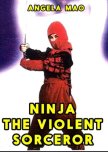
"We're all sick of Baker's vampires and bullying!"
Some movies are so bad they are good. Some movies are so bad they are bad. And then there is Ninja the Violent Sorcerer that is so bad it is WTF? Spliced and diced from The Stunning Gambling (1982) with new footage added for a story told in English, assumed director Godfrey Ho created a Frankenstein film of gambling, ninjas, a vengeful ghost, and hopping vampires.Gambling pro Mr. Myer, is tricked into killing himself during a gambling bet with the evil Mr. Baker. Myer’s dead wife appears in ghostly form to his brother Roger and tells him he must avenge her husband. Baker cheated by using hopping vampires…somehow. Collins works for Baker by shaking down people who owe the baddie money and using the invulnerable hoppers as muscle. What Baker and Collins don’t know is that Roger is secretly a ninja (white). His buddy, Ken, is also a ninja (green) and amateur Taoist. They have Myer’s son contact Webber, an incredible gambler who has turned into a drunk. Webber is the only man who has a chance at beating Baker. Roger and Ken gear up to take on Collins and his jianshi hitmen while Webber attempts to bring down Baker.
I was lured into watching this film with the promise of Angela Mao and hopping vampires. It was false advertising in regards to Angela. She appeared briefly in one scene where she handed Webber, who was suffering from the shakes, a bottle of booze. The hopping vampires did appear fairly often. And I actually bumped my score up for the actors’ commitment to their craft. Despite two ninjas attacking them, they kept their arms in front of them and continued to hop. The ninjas were at a loss as to how to stop the hoppers. Where’s Lam Ching Ying when you need him?
Godfrey Ho had 40 different pseudonyms and most people are convinced Bruce Lambert was one of them. If you enjoy his patented form of theatrical chaos and mania, you might want to try this. Of if you are curious how not very good ninjas would stack up against hopping vampires, you might want to try this. Otherwise, best to hop on by.
23 October 2024
Trigger warnings: Brief nudity. Really bad acting.
Was this review helpful to you?
Recent Discussions
-
 Dramas recommendation with OBSESSIVE SML2 minutes ago
Dramas recommendation with OBSESSIVE SML2 minutes ago -

-
 The best ending interpretation I've read (SPOILER)36 minutes ago
The best ending interpretation I've read (SPOILER)36 minutes ago -
 Novel spoilers1 hour ago
Novel spoilers1 hour ago -



